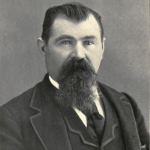
Some men achieve success almost instantaneously, some by slow accretion, others only after long and patient working and waiting. The experience of men who are willing to work persistently and intelligently and wait calmly goes to prove that success may surely be attained during an ordinary lifetime, and no man not cut off at an untimely age need work and wait in vain. These reflections have been suggested by a consideration of the career of Hon. George B. Rogers, receiver of the United States land office at Blackfoot, Idaho, who is one of the most prominent and successful citizens of the state. He was born in Dodgeville, Iowa County, Wisconsin, February 22, 1842. His father, John Rogers, was born in England and there married Miss Hannah Bailey. They came to the United States in 1837, bringing with them two daughters, named Susan and Elizabeth, and located at Mineral Point, Wisconsin, where Mr. Rogers engaged in lead-mining and later became a farmer. He died in 1880, aged seventy-six years, and his wife passed away in 1882, aged seventy-three. They were lifelong members and supporters of the Methodist Episcopal church. Six more children were born to them in Wisconsin, of whom George B. Rogers was the second in order of nativity and of whom two others are living.
George B. Rogers was brought up on his father’s farm and at a tender age gained an intimate acquaintance with hard work and long hours. The winter schools of that day and locality were poor, but such as they were he attended as opportunity presented, and later he attended night schools, but he may be said to be practically self-educated.
In 1862 Mr. Rogers went to California by water and was twenty-six days en route. He left Wisconsin with borrowed capital to the amount of three hundred dollars. For a time he worked for three dollars and a half a day in the middle California mines, and a knowledge of lead-mining he had acquired while working with his father in Wisconsin proved of great service to him in this employment. Then he went back to San Francisco and from there to Victoria, British Columbia. Thence he came back to Portland. Oregon, and from Portland he came to Idaho, in 1865, and went to the placer mines in Boise basin and worked for wages in the Elkhorn mine. At the time of Salmon River mining excitement he went to that district. He worked there two months, in 1867, and went from there to Montana. The succeeding two years he put in at the mines at Helena and the next two years in prospecting in Nevada and Idaho. He then returned to Montana and worked six months in the old Cable mine. He then bought mules and engaged in freighting between points in Utah and Montana and, in partnership with C. W. Berryman, continued that business successfully for fourteen years. An idea of the extent of their operations will be afforded by the statement that they owned considerably more than one hundred mules and much of the time kept six twelve-mule teams and eight six-mule teams busy. The work was always arduous and sometimes dangerous, but it was profitable, and when, in 1882, Rogers & Berryman sold out, they found themselves well on the way to fortune. Conditions had changed and the business that had served them so well was of decreasing value. They now turned their attention to stock-raising, in which they have been eminently successful. They own twenty-six hundred acres of land twelve miles northwest of Blackfoot, and most of it is improved and fenced. Six hundred acres of this land lies just outside of Blackfoot. This extensive property is in every way adapted to stock raising, and is as valuable as any land of its class in the state. At times there are as many as five hundred horses and two hundred to five hundred head of cattle on these ranges, and a speciahy has been made of bringing fine blooded stock from the east. Thus Mr. Rogers and his partner have improved their own stock and have at the same time raised the standard of stock throughout this whole section.
Mr. Rogers’ interest in the growth and prosperity of Blackfoot has been manifested in many ways, and he has been influential in advancing the public interests to a degree that renders him conspicuous as a public-spirited citizen. In 1885 he erected one of the best residences in the city. He has been a lifelong Republican, and was elected a member of the first Idaho state senate, in which he served on several important committees and was active in securing the passage of the law authorizing the use of the Australian ballot system in the state. For two years he was one of the county commissioners of Bingham County. In October 1897, he was appointed, by President McKinley, receiver of the United States land office at Blackfoot, an office which he is filling ably and affably and to the entire satisfaction of every one interested in its administration.
Mr. Rogers was married in 1876 to Elizabeth Toombs, a native of England, whose father, James Toombs, is now a resident of Ogden, Utah. They have four children: Eva, the eldest, is the wife of E. J. Frawley, a prominent lawyer of Boise, Idaho; Walter John, their oldest son, manages a ranch for his father; and Raymond and Susie, two young children, help to make glad their delightful home.
